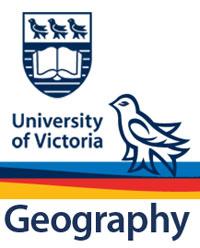Moving on to the 4th stop on our Cascadian adventure, our group was stoked to see what this city of [sustainable] dreams had to offer. Spud and the Chicklets set the stage and orientated our group in the Northwest District, visualizing the city through the eyes of a true Portlandia native. With five days under our belt to explore and discover, the group got some sick memories to carry on our field school legacy.
May 25- Laying down the roots: Planning a Sustainable Portland
Planning has made this small metro region of 1.5 million an internationally recognized ‘green’ masterpiece. Andrew Cotugno, a senior policy advisor for ‘Metro’ (Portland’s regional government), explained the ins and outs of how residents have accomplished milestones in sustainable livability through a larger scale framework rather than independent municipal governments (something Victoria could learn from). Several indicators of livability included top-notch biking infrastructure, access to green space, and an expansive public transit system. Pro-green politics have influenced radical planning techniques since the mid-20th Century, following a motion to use federal tax money for new public transit instead of building more freeways. Today, the urban growth boundary reflects these values, preventing sprawl from expanding into agricultural zones and protected green spaces over a long term, 45 year growth strategy. Residents support the sustainable motif of the city as well, with the highest biking commuter percentage in the country, and an economy reliant on public transit access. While still an industrial town, Portland has displayed a certain resiliency from locally-based economies that has allowed it to bounce back from economic recession stronger than other cities across the United States.

May 26 – Exploring the streets: Our Journey with First Stop Portland
On Tuesday, our kind friends from First Stop Portland and PSU led us on a walking tour of several Portland neighbourhoods. It was a packed day with a ton of information to cram into our heads, but all of it was informative and inspiring. We were led by two students from PSU, Sarah and Lauren, and the organizer of First Stop Portland, Sara Iannarone. We first saw the Pearl District, an area of urban renewal and an abundance of parks, including a constructed wetlands park. Highlights of the area included the walkability and accessibility for bikes, the green-space, and the Ecotrust Building, a heritage building that has been revitalized and is now a LEED gold certified building. During the tour we were able to pick the brains of our fabulous guides, and learned some interesting features of Portland’s development, like their culture of private/public partnerships and some neat research linking walkability with graduation rates.
Our next destination was Mississippi Street, another site of urban renewal and redevelopment. We passed some of the famous Portland food trucks on the way to the Rebuilding Center, which is essentially a thrift store for used building materials. We were guided through the center by co-founder Shane Endicott, who explained the concept and its origins. The center accepts used and unwanted building materials, from toilets to doors to lumber, and sells it for at least 50% less than what the market price would be. They also do their own deconstruction jobs, where instead of demolishing a building, they deconstruct it piece by piece in the opposite order they put it up in (which also happens to create 6 to 8 more jobs than a conventional demolition would)
Check out a house deconstruction here: http://www.youtube.com/watch?v=ZFxSAUtiwFs
The Rebuilding Center was a very cool example of a sustainable, environmentally friendly business model, but more than that, the Center and Shane were inspiring examples of perseverance and optimism. Shane shared the origins of the center, when they had an idea but no funds, and how they have grown to now employ 36 paid employees, 2000 volunteers, and run various workshops. The philosophy of the centre is very community-oriented and they emphasize sharing their knowledge – something that is important for community-building and making relationships. They also make an effort to be involved in the local community, like helping local youth and local businesses team up for summer employment, which helped to ease the process of gentrification. Our whole group was inspired by the success of the Rebuilding Center, because they started from nothing and built themselves into a sustainable and inclusive business through optimism (a Cascadia course theme) and perseverance. The story was also reminiscent of that of OUR Ecovillage in Shawnigan Lake, which was also a tale of optimism and perseverance.
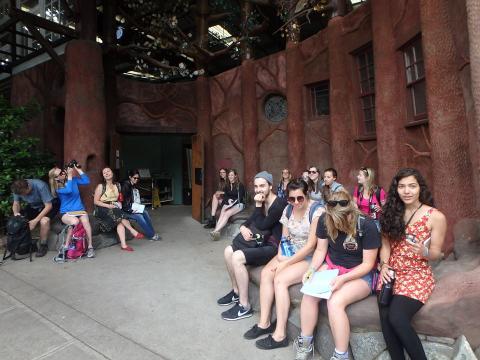
Our tour continued in the afternoon with New Seasons Market, a grocery store that is a certified B-corp. This means that on top of making a profit for their shareholders, they are committed to benefiting society as well. They donate 10% of the profit after tax to various social programs. We were particularly interested in the fact that they have a paid position of “sustainability manager”, who oversees various store practices to ensure they are sustainable, such as an extensive recycling program that ensures waste is sorted and has found good markets for their plastics.
The final piece of our tour was a talk by planning consultant Michelle Poyourow, who spoke about a bit about Portland’s famous cycling infrastructure and planning. She also explained how North Portland changed from a predominantly African-American neighbourhood to a younger, white neighbourhood, leading to cultural clashes. She also encouraged us to think about the concept of “cyclists” and its divisive connotations - many people who ride a bicycle (in Michelle’s experience, often African American) don’t consider themselves “cyclists”, as it is considered a white, affluent activity. This raises the question of how to make cycling more inclusive and accessible activity.
The day ended with some well-deserved Mexican food and local beer, over which we debriefed and discussed our jam-packed day.
May 29 – From the ground up: permaculture and community-building with Hood River Middle School and City Repair
Our group of Cascadians paired up with Victoria’s Claremont High school for a day trip to Hood River Middle School and Portland’s City Repair. At HRMS, Michael Becker started the student garden in 2008, although his vision for a student run garden appeared much earlier. Becker’s successes at Hood River Middle School exceeded any other school he previously worked at, as it was the first public school in the U.S.A to be net zero. The Middle School has held LEED platinum status for two years in a row, and they have no electrical bill. We were impressed by their conservation of energy, permaculture design, but mostly the independent nature of the students.
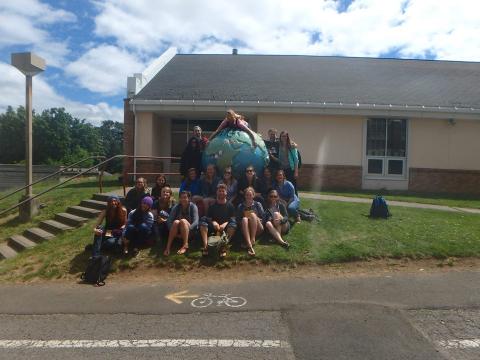
Students led the tour of the school and explained how the program worked. Everything that was built in the garden, from growing plants to building infrastructure was created and built by the students. The garden is seen as a giant experiment and a laboratory for students to express ideas and creativity. The food grown in the garden is used in the cooking classes by 6 and 7 grade students. Any leftover food is sold in the farmers market every Thursday, or frozen for future meals. Michael Becker explained that, “it’s not about the elements of the system, but the connections in the system.” This can refer to the biological systems in their garden, but also to the connection between growing food and distributing it.
Michael has also incorporated the projects of permaculture into other school subjects such as problem solving in math, to take real life examples into everyday school work. It was easy to see how independent the students were in their roles, and how proud they were to show us around. Many of us Cascadians wished we could have experienced or had the opportunities these students have, but also would like to see more permaculture design and integrated courses at the University of Victoria. Food security is central to sustainability, and permaculture is considered a highly sustainable practice - having a course on it would help students delve deeper into what sustainability really means.
City Repair
“Everything starts with someone saying it’s impossible” – Mark Lakeman

We arrived at Mark Lakeman’s house just in time for a delicious lunch and an afternoon of exploring his property, perspective and neighbourhood. For the past 14 years City Repair has held the Village Building Convergence festival consisting of grassroots, activist, permaculturist and community members in a 10-day place-making event across Portland. Projects are created and led by community members and are open to the public to volunteer and join the festivities.Mark Lakeman believes that creating more gathering places is essential to bringing people together and peacemaking, as they are places for communication and interaction. Street intersections through painting them and building community infrastructure (benches, free tea stands, etc) is an example of claiming space that may initially be only used for cars, but instead is turned into a meeting and gathering place. We were unfortunately unable to attend the day of painting the intersection during the Village Building Convergence event, but we did have a chance to visit a previous painted intersection and tour the neighbourhood.
Portland is a unique city, as people embrace their power and democracy to create places for community, and interconnect these nodes of community through a network rather than being isolated. We could all learn from Portland and take more action towards bettering our communities, cities and the world, rather than just talking about it. As Mark Lakeman said “save the world and savour the world.” Creating a network of community gathering places will not only create spaces for democracy and peace, but will make life more enjoyable through our increased connection to one another. Hearing Mark’s stories, barriers, and successes inspired us to make a new story for our communities and the world, or as he calls it, “restorying.”
Our group of Cascadians dispersed in the evening, but a group decided to visit the “Last Thusday” block party on Alberta Street, which was a big in celebration for the Village Building Convergence. 15 city blocks were cleared of car traffic to make way for artists, musicians, food vendors, Portlandians and tourists to get together and have some fun.
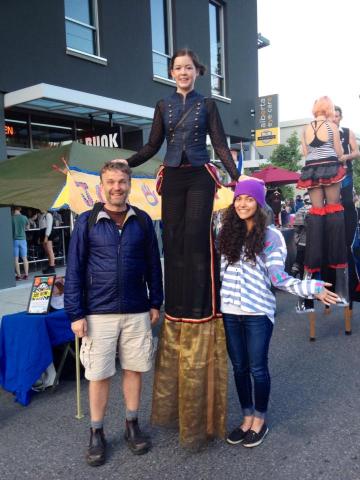
May 30 – Free Day
On our last day in town, Cascadians had a chance to explore local delicacies, sights and events all while catching some serious rays in 26C+ weather.
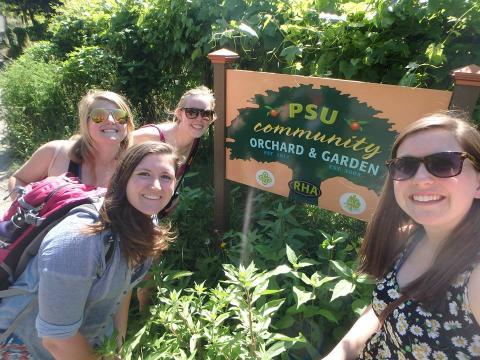
The urban food forest at PSU is a VBC project that welcomed the public to assist in permaculture activities for several hours in the afternoon. A well-established community garden, the university grounds had kept it thriving over the course of 14 years with strong dedication from both students and local residents alike.
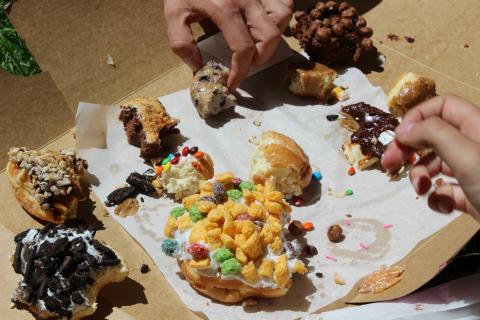
Voodoo Doughnuts, a decadent bakery serving funky, specialty treats, is a must stop in Portland. Here the group is trying a variety of colourful doughnuts in a local green space.
A couple of Cascadians made their way up the Portland OHSU (Oregon Health and Sciences University) Aerial tram and a fantastic view of the city from above. The tram is frequently used as a public transit system by local students and staff to commute to the local LRT line and bus routes below.
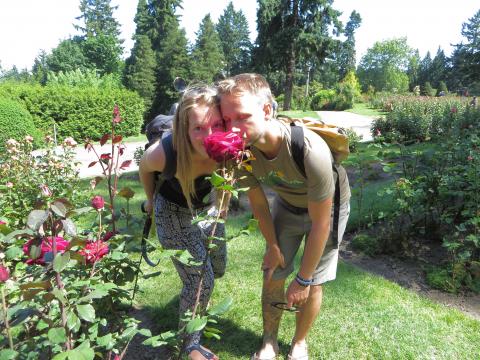
Washington State park was one of the many green spaces our group enjoyed a break from the sun; Portland’s rose garden is situated in the park and with over 40 varieties of roses, summed up the branding of Portland as the City of Roses.
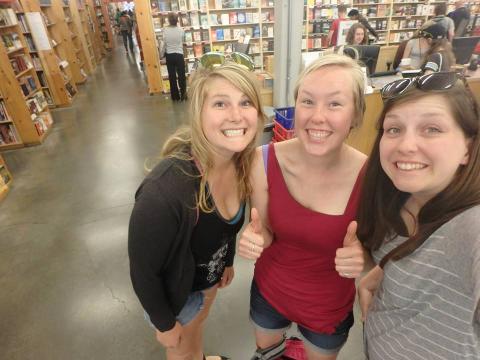
Avid readers and literature lovers alike indulged in Powell’s City of Books, a massive bookstore with virtually every category imaginable, from new to rare, out of production prints. A popular business, the bookstore has multiple locations throughout the city.
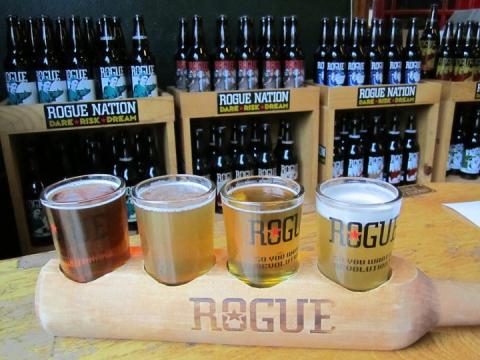
In the evening, we spent the night celebrating a Cascadian’s birthday and went out on the town with some local microbrews and dancing. Onto Southern Oregon we head!

